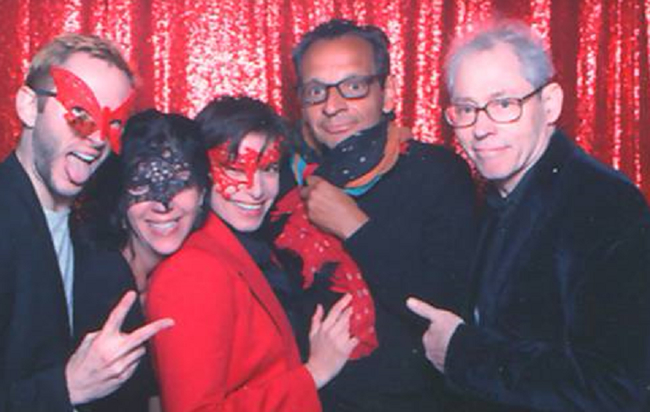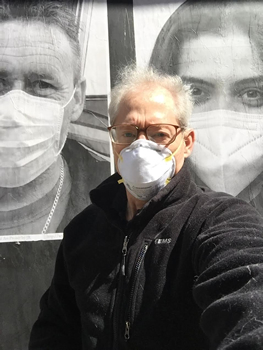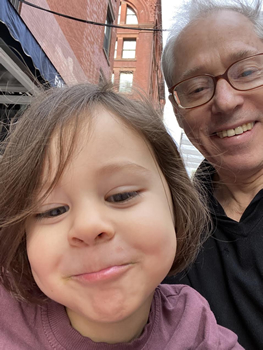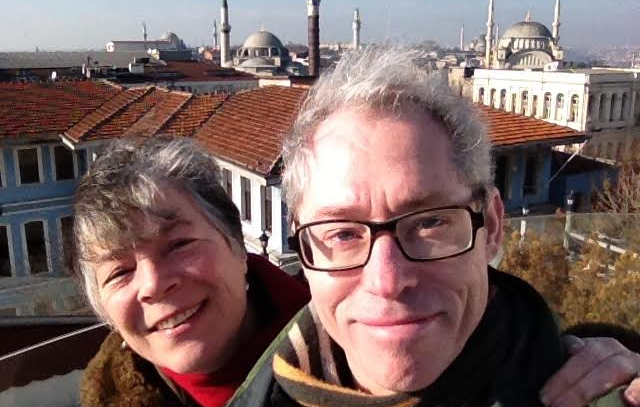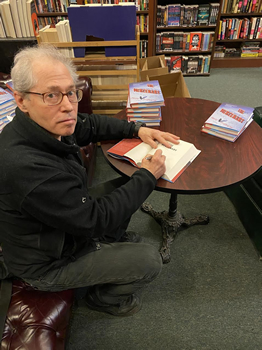

Up Close: Paul Vidich
Evoking the Mood of Cold War-era Berlin
 By Esme Addison
By Esme Addison
Bestselling author Paul Vidich takes readers back to Cold War-era Berlin with his latest spy thriller, THE MATCHMAKER.
The story follows American translator Anne Simpson, who believes she is in a normal marriage with a charming East German man—until he disappears one day, and both the CIA and German Intelligence are at her door.
As it turns out, her life isn’t at all what it seemed.
In fact, Anne had been targeted by the Matchmaker, a high-level East German counterintelligence officer who runs a network of “Romeos”—agents who marry vulnerable women as cover. They’re desperate to find Anne’s husband because they think he can help them identify the Matchmaker.
But Anne has her own reasons for finding the Matchmaker—and her reasons don’t necessarily align with the CIA.
In this interview for The Big Thrill, Vidich shares insight into what led him back to this era, why he writes about spies, and how he brings his stories to life.
I thought you did a wonderful job of evoking the mood of Cold War-era Berlin and painting the scene for THE MATCHMAKER. I could practically feel the bone-chilling coldness, see the drab and dreary palette, and smell the cigarette smoke filling the rooms. You first visited this time period with The Mercenary. What compelled you to revisit this era again?
The world order of my youth crumbled in the late 1980s, the time frame for both The Mercenary and THE MATCHMAKER. Everything I had been told to think about the Soviet Union and the Warsaw Pact countries, including East Germany, vanished. The forces of free expression and individual liberty brought down the hulking monolith of Communist authoritarianism. It had a profound effect on me. I was in my late thirties and had lived with the Soviet threat my entire life, and then one day, the threat disappeared. The curtain of propaganda was pulled back, and we saw the weakness of the authoritarian system and the bleak lives of its citizens. Lives were disrupted, lies exposed, dreams kindled. This is all the good stuff that fills a writer’s larder.
What do you think accounts for your continued interest in writing about the lives of spies? Is it the mystery surrounding your uncle CIA Scientist Frank Olson’s life (and death)? Or did your interest precede him?
A literary agent approached me after he read my short story that won an award and asked if I had a novel he could represent, which I did not have. But I did have a personal family tragedy— the murder of my uncle, Frank Olson—which had the potential be a novel. I struggled with my first effort to turn his bioweapons work for the CIA into a novel, but I was too close to the story to write objectively. I abandoned that novel (although I would come back to it a few years later), but I had found a character that interested me: a man inside the CIA doing top secret work that troubled him. He couldn’t discuss his secret work with his wife without compromising security, and he couldn’t share his doubts about his work with colleagues without appearing to be disloyal. He was trapped in a stressful life and had deep moral ambivalence about his work. That idea fascinated me: personal conflict, moral doubts, family secrets, the dangers of covert work. It was a rich palette of colors for the human stories that I wanted to tell. We all have secrets. Secrets are a part of our lives and the lives of literature’s great characters. But spies operate in a more complex world of secrets—things they hide from family, from friends, and from themselves. I found that a compelling premise in which to explore the human condition.
You interviewed Paul Kanon for CrimeReads and spoke at length about his work routine, which of course makes me interested in how you write. Would you walk me through your writing routine?
I write at our dining room table, which looks across our large loft, and the empty space frees my imagination. Usually, I work for four or five hours with a cup of black coffee, one sugar, no milk. I do this every day. I went to my office in Rockefeller Center every workday for two decades, and that regimen instilled in me a work ethic that I have transferred to writing. Writing is work—it is very satisfying work, but it is work. I write the first three or four drafts of a novel long hand in lined Moleskine notebooks using the same Mont Blanc pen. Each of my novels has been written with the pen, and I also use the same pen to sign copies of my book. I like to think that my signature carries some of the book’s spirit. These little rituals make the work of writing come more quickly.
Are you a plotter or pantser? What comes first? The idea? The setting? An event? A character? Would you share how you conceive your idea and then implement the writing of the story?
I plot and I panse (if that is a word), but the process of envisioning a book starts with place. Then comes a character. A person who finds herself in a particular place at a particular time, and from that emerges a story that is shaped into a plot. It starts with place. Berlin 1989. Moscow 1985. Havana 1959. Then I discover a character, and from the character the elements of story develop. The book’s idea is inextricably linked to a place. An exfiltration from Moscow in 1985, for example. Setting begets characters, and characters set the stage for story and plot.
How long did it take you to write THE MATCHMAKER?
I did about six months of research before I sat down and began to write the novel. It took me another six months to write four complete drafts of the book. The first draft took about two months, which is pretty quick, but the speed of the draft was directly in proportion to the amount of research, outlining, and thinking I did before I put pen to paper. There were another three or four months of editing and shaping to address comments from my wife, my writers’ group, and my editor and agent. The hard part is to be patient with the characters and the story. I begin writing only when I am familiar with the world I want to bring to life on the page.
Is the final product the original book conceived?
The finished novel is true to the original outline, but the completed book is filled with complications and surprises that only emerge from the actual writing. As my characters develop in the book and begin to take on a life of their own, they begin to shape the story in subtle but critical ways.
What type of research did you do for this book?
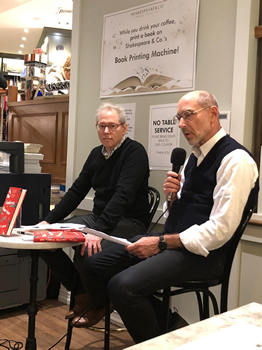
Vidich holds a reading of his 2020 thriller The Coldest Warrior with Fred Wistow at New York’s Shakespeare and Co. bookstore.
Research is a critical part of my writing. My books are set in an historical moment, and I try to absorb the lost time and distant place by reading extensively. This book is set in Berlin in 1989. While I have visited Berlin several times, I was not there in 1989, and I never visited East Berlin. I read extensively to understand the city at that time, including historical accounts and biographies. Of particular value was the autobiography of Markus Wolf, the legendary head of Stasi counterintelligence, who became an inspiration for one character in the novel. Research helps me discover all the little details of life that help give the book a feeling of authenticity. Autobiographies of spies are particularly helpful. I’m able to understand the ambitions, fears, regrets, and vulnerabilities of men and women in the world I’m describing.
Google maps and place locations are an important part of my research. THE MATCHMAKER is a tale of two cities. Communication between East and West Berlin is an important plot point in the novel. I used maps to discover a place where an apartment in West Berlin faced an apartment in East Berlin and the tenants in each could signal each other secretly. I found this location by looking at Berlin maps from 1989.
People’s accents and speech patterns are also something I research. Language for me is a bit like terroir for wine. Place of birth defines who you are and shapes your phrasing, your cadence, your accents, and helps reveal character.
Did you create the idea of the Romeos, a network of male spies that target and marry American women for their access to classified information? Or is that based on a real honeytrap strategy? If it is real, can you share some books you read on the subject?
The Romeo character in the book is based on tradecraft developed by Markus Wolf, which has come to be known as the Romeo network. He trained handsome East German men to introduce themselves to West German women who they could use as cover for their covert espionage. Often these women worked in government and had access to secret information, but not always. Sometimes it was enough that the spy and his unwitting wife look like a normal couple. The women chosen tended to have a problem that made them open to companionship—a drinking problem, loneliness, a money problem. The women were victims of Cold War spycraft. Markus Wolf’s autobiography, Man Without a Face, provides colorful detail on the Romeo network.
I bet you love the show The Americans, right? If you watched it, what did you think of it? Realistic or no?
The Americans is a wonderful show. One of its executive producers, Stephen Schiff, is a good friend and a fine screenwriter. “Illegals,” the terms used by the KGB to describe sleeper agents undercover in the US, lived mostly dull, ordinary lives, and were never as interesting or good-looking as the characters in The Americans. The show realistically describes the “illegals” program in the US, but its characters are more vivid and interesting than the meager lives of the real Soviet men and women who lived mostly quiet, suburban lives. Long years of little action punctuated by brief moments of excitement.
Do you have any favorite TV shows or films that have a similar feel to your works? Or could be a good comp to THE MATCHMAKER?
I am a big fan of the director Carol Reed’s movies, particularly The Third Man, with its screenplay by Graham Greene. Some of the film adaptations of John le Carré’s novels are quite good, particularly The Night Manager. I also enjoyed the recent Israeli TV series The Spy, starring Sacha Baron Cohen and Noah Emmerich, who was also in The Americans.
In THE MATCHMAKER, the protagonist is an interesting character. Very flawed. A little weak. A little strong. Mostly likable but absolutely real. How did you craft her character?
Anne Simpson, the protagonist in THE MATCHMAKER, is different from the protagonists in my earlier novels: a woman and not a spy. I had in mind the trope used by Eric Ambler in his early novels, and in the film North by Northwest, in which a wrongly accused innocent person must uncover the true criminal to vindicate herself. There is a bit of Anne Simpson in that type of character. I wanted a character who, upon discovering the lie of her marriage, has to come to grips with her past and take action. She is startled, hurt, and then angry when she discovers the deception. I wanted to write a character who has to look inside herself to discover how she could allow herself to be so profoundly misled. I tried to write a character who would make an interesting dinner companion.
I’m currently working on an espionage novel, and I find that writing about the challenges facing the spy, the internal turmoil as it were, is almost as interesting as writing about the missions and external obstacles the spy faces. You seem particularly talented at crafting these characters. How do you get into the head of the spy or intelligence operative so successfully?
I never worked for the CIA, but I worked for a large media bureaucracy and the elements of bureaucracies, whether the CIA or a corporation, are the same. Individual lives join in the work of the organization. But each individual has a family, a life, needs, wants, regrets, and vulnerabilities. I start by looking at the personal lives of the characters and then I explore the work they do. Espionage is a particular type of work, but each of the men or women engaged in espionage is first a private person who steps into a work personality at the office. John le Carré brilliantly captures a particular class of Englishman who happen to enter the world of MI6.
One of my favorite espionage authors is Helen MacInnes. I’m happy to share that her entire catalog is publishing as audiobooks this year! Who do you count as your favorite author in the genre?
My favorite authors in the genre are Eric Ambler, John le Carré, Graham Greene, and Somerset Maughan. Among contemporary authors of the genre, I like Joseph Kanon, Alan Furst, and Charles Cumming.
For your next book, will you stay in Cold War Germany, or focus on a different time period?
My next book is set in Beirut in 2006 during the 34-day war between Hezbollah and Israel. The Cold War had turned into The War on Terror.
- Between the Lines: Rachel Howzell Hall - June 30, 2022
- On the Cover: Zarqa Nawaz - May 2, 2022
- International Thrills: Kate Quinn - March 31, 2022


